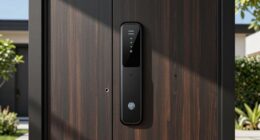Unplugging from digital devices offers numerous benefits for your well-being. It helps reduce feelings of anxiety, stress, and loneliness caused by constant notifications and social media comparison. Taking a break improves your sleep, boosts mental clarity, and fosters genuine in-person connections. By setting boundaries and unplugging regularly, you reclaim your time and emotional space, leading to a more balanced and fulfilling life. Explore how a digital detox can truly transform your mental health and overall happiness.
Key Takeaways
- Reduces anxiety, stress, and feelings of loneliness by minimizing digital overload and social media comparison.
- Improves sleep quality by decreasing blue light exposure and calming the mind before bedtime.
- Enhances mental clarity and mindfulness through breaks from constant notifications and mental clutter.
- Fosters real-world connections and encourages hobbies, boosting mood and self-esteem.
- Creates space for physical activity, quiet moments, and self-reflection, promoting overall well-being.

Have you ever felt overwhelmed by constant notifications and endless scrolling? If so, you’re not alone. Many people find themselves caught in a cycle of excessive screen time, especially when it comes to social media. It’s easy to get sucked into the never-ending feed of updates, likes, and comments, but this constant digital engagement can take a serious toll on your well-being. Spending too much time glued to screens not only drains your energy but also hampers your mental health. When your day revolves around social media, you might notice increased feelings of anxiety, stress, or even loneliness. That’s why taking a break from digital devices, or a digital detox, can be incredibly beneficial.
Unplugging from your devices allows you to reconnect with yourself and your surroundings. When you step away from screens, you create space for more meaningful activities — whether it’s engaging in physical exercise, pursuing hobbies, or simply enjoying quiet moments. Reducing your screen time often leads to better sleep, as the blue light emitted by devices interferes with melatonin production. Without the constant bombardment of notifications, your mind can relax, making it easier to fall asleep and wake up refreshed. This break from social media also provides perspective, helping you realize how much time you may have been wasting scrolling through content that doesn’t truly add value to your life. Additionally, practicing mindfulness can enhance your awareness of digital habits and promote healthier boundaries.
A digital detox helps you regain control over your attention span. Social media apps are designed to keep you hooked, with algorithms that feed your interests and keep you scrolling longer. When you detach from these platforms, you’re less likely to fall prey to comparison, envy, or the fear of missing out. Instead, you free up mental space for introspection and real-world connections. You might discover new interests or hobbies that you hadn’t explored before, which can boost your mood and self-esteem. Additionally, stepping away from screens fosters better relationships, as you become more present during conversations and shared experiences.
While it may seem intimidating at first, a digital detox doesn’t require going completely offline forever. Even short breaks—like a few hours a day or a weekend—can make a noticeable difference. The key is to be intentional about your digital habits and set boundaries around your use of social media and devices. By doing so, you give yourself the opportunity to recharge mentally, physically, and emotionally. Ultimately, unplugging from the digital world isn’t just about reducing screen time; it’s about reclaiming your time, attention, and well-being for a more balanced and fulfilling life.

livho Gaming Blue Light Blocking Glasses for Better Sleep, Premium Night Driving, Computer Blockers for Man & Woman
REDUCE EYE STRAIN: These glasses for computer eye strain limit your blue-light exposure and alleviate eye strain, headaches,…
As an affiliate, we earn on qualifying purchases.
As an affiliate, we earn on qualifying purchases.
Frequently Asked Questions
How Long Should a Typical Digital Detox Last?
You might wonder how long a digital detox should last. Generally, setting a break of at least 24 to 48 hours helps you reset screen time habits and establish healthier tech boundaries. If you can, extend it to a week for deeper benefits like improved focus and reduced stress. Listen to your needs, and remember, even short detoxes can make a big difference in balancing your digital and real life.
Can Digital Detoxing Improve Mental Health?
You might find that reducing your screen time and taking a break from social media can considerably improve your mental health. When you unplug, you allow your mind to rest, decrease anxiety, and improve focus. Digital detoxing helps you reconnect with real-life experiences, boost mood, and lower stress levels. So, stepping away from screens and social media can be a powerful way to support your overall mental well-being.
What Are Practical Ways to Start Unplugging?
Did you know the average person spends over 7 hours daily on screens? To start unplugging, set clear tech boundaries, like no screens an hour before bed or during meals. Reduce your screen time gradually, and try activities like reading, walking, or meditating. Turn off notifications to resist constant urges to check devices. These small steps help you regain control and enjoy more offline moments.
Does Digital Detoxing Affect Work Responsibilities?
Unplugging can temporarily impact your work responsibilities, but setting clear technology boundaries helps you maintain work-life balance. When you intentionally disconnect, you create space to recharge, leading to increased focus and productivity when you return. Communicating your boundaries to colleagues ensures you’re not overwhelmed. Ultimately, balancing your digital use supports your well-being and helps you stay committed to your work without feeling constantly connected.
Are There Any Risks Associated With Digital Detox?
You might worry that a digital detox could lead to missing important updates or work tasks, but risks are minimal if planned carefully. While it can help reduce screen addiction and digital fatigue, there’s a chance you might feel temporarily disconnected or anxious about missing out. To avoid this, set specific times to check messages and stay organized. Overall, the benefits outweigh the risks, promoting better mental health and focus.

The Digital Detox Journal: Your 30-Day Digital Detox Guide
As an affiliate, we earn on qualifying purchases.
As an affiliate, we earn on qualifying purchases.
Conclusion
Remember, sometimes you need to unplug to truly reconnect with yourself. Taking time away from screens reduces stress, boosts your mood, and improves your overall well-being. Just like a garden needs rest to flourish, your mind benefits from digital detoxes. So, put down your devices, breathe deeply, and embrace the quiet moments. After all, a little break now can lead to a healthier, happier you—because sometimes, you have to disconnect to reconnect.

Mindsight 'Breathing Buddha' Guided Visual Meditation Tool for Mindfulness | Slow Your Breathing & Calm Your Mind for Stress & Anxiety Relief | Perfect for Adults & Kids | Relaxing Self Care Gift
🧠 WHAT IT'S FOR: Daily guided breathing to help calm & focus your mind during the day or…
As an affiliate, we earn on qualifying purchases.
As an affiliate, we earn on qualifying purchases.

Zeacool Fitness Tracker with 24/7 Heart Rate, Blood Oxygen Blood Pressure Sleep Monitor, Activity Trackers 5 ATM Waterproof,Step Calorie Counter Pedometer Health Smart Watch for Women Men (Black)
24/7 Heart Rate Monitor :This blood pressure watch supports real-time dynamic heart rate, blood oxygen, blood pressure ,Sleep…
As an affiliate, we earn on qualifying purchases.
As an affiliate, we earn on qualifying purchases.










